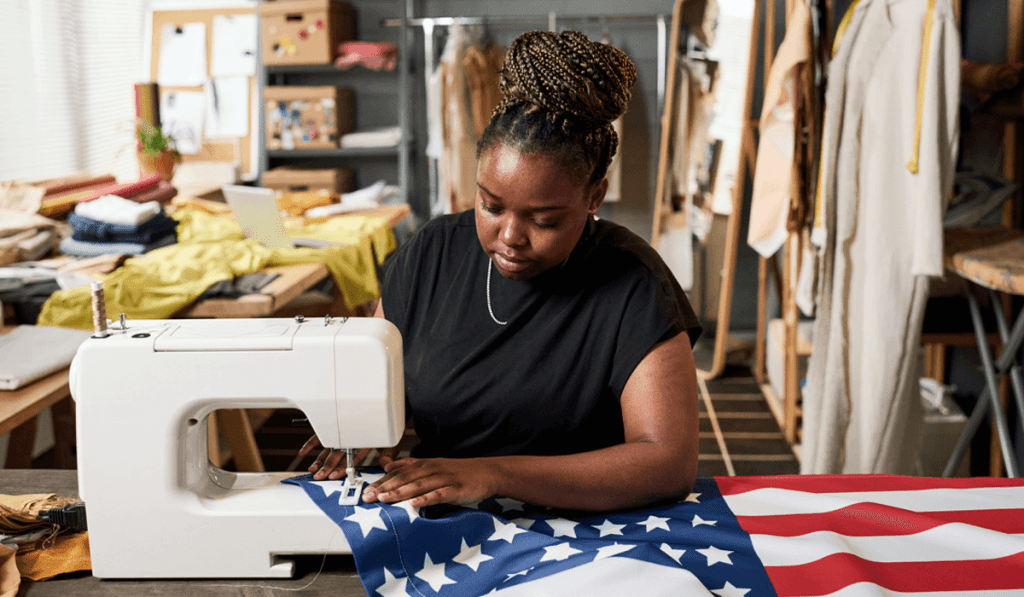When Americans think about July, the first place their minds go to is often Independence Day. This patriotic midsummer celebration is a favorite for cookouts, fireworks, and a lot of red, white, and blue.
But the Fourth of July isn’t the only day spotlighting the U.S. this month. Did you know that July 2nd was National Made in the USA Day? This lesser-known holiday was started as a way to highlight craftspeople, artisans, and other business owners creating goods made right here in America. Wondering whether you meet the requirements and if you can market your Made in USA products? Read on to learn more about why consumers might like American-made products, and how to use that to your advantage if yours are.
What are the Benefits of Buying American?
Better quality.
Consumers often associate “Made in USA” with higher-quality products. Why? According to the Brookings Institution, U.S. manufacturing meets high-quality standards in terms of policies, regulations, and energy. For many Americans, a “Made in USA” stamp implies high-quality standards. U.S.-made products may be easier to quality-control and are, as a result, often preferred by consumers.
Limits environmental impact.
Because they aren’t dependent on international supply chains, products made in the USA are often considered more environmentally friendly. This isn’t just a philanthropic incentive for business owners to stick exclusively to products that are made in America — it also has the potential to be a big selling point. A study showed that 72% of respondents were intentionally choosing more sustainable products than they did five years ago.
Supports the economy.
While consumers are often focused on prices, many are interested in exploring local alternatives to major retailers. Small businesses offering American-made goods can be a great way to fight back against big-box stores. Every time you shop small it’s a boost for your local economy.
How to Market Your American-Made Products
Lead with the main benefits.
Highlight the main selling points of buying American.
- Discuss any sustainability initiatives you’re undertaking with your business.
- Lean on the quality of your U.S.-made products.
- Appeal to customers to try buying local by giving a behind-the-scenes look at how you keep your offerings domestic.
Update your mission statement.
Remember what we said earlier about there being high standards for American-made products? Here’s where those come into play. In order to use “Made in USA” in your branding and marketing, you need to comply with federal requirements. If you meet all the criteria for the Made in USA standard, use that to your advantage. Write a mission statement outlining your commitment to remaining American-made. You can even add a page to your website discussing what your business stands for, and how you put that into action.
Tags and packaging with a Made in USA stamp.
Get creative. Marketing materials and your website are great ways to spread the American-made message, but aren’t helpful for a new customer visiting your store for the first time on a whim.
Consider your product packaging. Incorporating the Made in USA stamp to your packaging is only the beginning. Consumers also appreciate knowing where companies source their materials, and U.S.-made products can make sourcing transparency easier. Create a design that gives a nod to where your goods and materials come from. Say you make goat milk soap — your packaging could depict a pastoral scene, and include which farm supplies you with the milk.
Share the human element.
A business doesn’t run itself. Behind every success is a skilled person — or several — who made it happen. So share your story. Why did you start your business? Why is it important to you to offer domestic-made goods? Look to your employees. Show how they contribute to the process. This promotes transparency and allows consumers to look behind the scenes at all the hard work that goes into manufacturing your products.
Get Insured in Under 10 Minutes
Get an affordable & customized policy in just minutes. So you can get back to what matters: Your business.
Nothing Beats Homemade
Committing to using materials made only on home turf isn’t always the easiest option. Think of it as an investment. More and more consumers are learning to shop small and reaching for sustainable products. A Made in USA stamp is a seal of approval that could help set you apart from your competitors and be a valuable asset for growing your brand. Start right away using that Made in USA stamp to your advantage.
Take pride in what you offer. Make “Made in USA” a part of your business’s brand. Then find business insurance to help keep your business protected.
